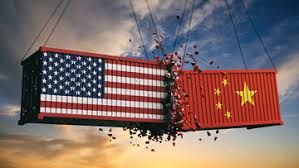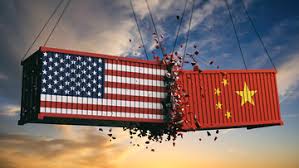
United States president Donald Trump had said, while he announced a new round of import tariffs on Chinese goods last week, that he was willing to sever all ties with China if needed to make Beijing agree to a trade deal.
"We don't need China," the president tweeted, "and, frankly, would be far better off without them."
However, if the trade war between the two largest economies of the worlds drags on for long, there are a number of American companies that stand to lose quite a bit.
Currently, a large part of revenues and profits are generated from the huge Chinese market by US companies such as Starbucks, Nike and Boeing.
"China has become the largest market to sell into for many of America's largest companies," says Shaun Rein, managing director of the China Market Research Group, an agency that advises US companies about doing business in China.
According to Patrick Chovanec, chief strategist at Silvercrest Asset Management, who taught in China for years, the US political debate often tends to ignore the impact of the huge consumer market of China and its growing importance for American companies. Instead the arguments in the US tend to be limited to the loss of a huge number of jobs because of the shifting of the production activities of US companies overseas because of lower labor costs, he says.
"I think that's one of the things that's often forgotten when we talk about the trade war, because usually it's framed in terms of outsourcing, which, yes, does exist. But there's this whole business of being in China in order to be in China," Chovanec says.
Citing an example, Chovanec says that more chicken is sold in China than in the US by KFC currently. "Wherever you go in China, there's KFC, there's Starbucks, there's McDonald's."
And last year, more vehicles were sold in China (3.6 million) than in the United States by the combination of General Motors and its Chinese partner. GM brands, such as Cadillac, and Boeing remain very popular in China.
Last year, Chinese sale accounted for over a third of all of the engines manufactured by Indiana-based Cummins. "We have a number of manufacturing facilities there and approximately 90% to 95% of the products that we make in China are sold in the China market," says Cummins spokesman Jon Mills. He said that the costs for research and development is funded by the revenues and profits made in China, which can also help to reduce the impact of lower sale sin the US.
It is also true that a lot of barriers are still faced by American companies in China with sectors such as banking is still closed to foreign companies. And joint ventures with domestic Chinese companies are forced on many American companies that want to operate in China. Another big problem is the theft of intellectual property.
According to Anna Ashton, senior director of government affairs at the US-China Business Council, the burgeoning middle class of China is now larger than the total population of the US and there is high potential to make money in the Chinese market.
"The vast majority of our companies have consistently reported and continue to report every year that their China operations are profitable — and not just profitable but more profitable than their operations overall," she says.
"The market in China — I am so bullish on it for the long term," Starbucks CEO Kevin Johnson told Bloomberg last month. "We're going to be able to accelerate and build new stores for a long, long time in China."
(Source:www.npr.org)
"We don't need China," the president tweeted, "and, frankly, would be far better off without them."
However, if the trade war between the two largest economies of the worlds drags on for long, there are a number of American companies that stand to lose quite a bit.
Currently, a large part of revenues and profits are generated from the huge Chinese market by US companies such as Starbucks, Nike and Boeing.
"China has become the largest market to sell into for many of America's largest companies," says Shaun Rein, managing director of the China Market Research Group, an agency that advises US companies about doing business in China.
According to Patrick Chovanec, chief strategist at Silvercrest Asset Management, who taught in China for years, the US political debate often tends to ignore the impact of the huge consumer market of China and its growing importance for American companies. Instead the arguments in the US tend to be limited to the loss of a huge number of jobs because of the shifting of the production activities of US companies overseas because of lower labor costs, he says.
"I think that's one of the things that's often forgotten when we talk about the trade war, because usually it's framed in terms of outsourcing, which, yes, does exist. But there's this whole business of being in China in order to be in China," Chovanec says.
Citing an example, Chovanec says that more chicken is sold in China than in the US by KFC currently. "Wherever you go in China, there's KFC, there's Starbucks, there's McDonald's."
And last year, more vehicles were sold in China (3.6 million) than in the United States by the combination of General Motors and its Chinese partner. GM brands, such as Cadillac, and Boeing remain very popular in China.
Last year, Chinese sale accounted for over a third of all of the engines manufactured by Indiana-based Cummins. "We have a number of manufacturing facilities there and approximately 90% to 95% of the products that we make in China are sold in the China market," says Cummins spokesman Jon Mills. He said that the costs for research and development is funded by the revenues and profits made in China, which can also help to reduce the impact of lower sale sin the US.
It is also true that a lot of barriers are still faced by American companies in China with sectors such as banking is still closed to foreign companies. And joint ventures with domestic Chinese companies are forced on many American companies that want to operate in China. Another big problem is the theft of intellectual property.
According to Anna Ashton, senior director of government affairs at the US-China Business Council, the burgeoning middle class of China is now larger than the total population of the US and there is high potential to make money in the Chinese market.
"The vast majority of our companies have consistently reported and continue to report every year that their China operations are profitable — and not just profitable but more profitable than their operations overall," she says.
"The market in China — I am so bullish on it for the long term," Starbucks CEO Kevin Johnson told Bloomberg last month. "We're going to be able to accelerate and build new stores for a long, long time in China."
(Source:www.npr.org)





